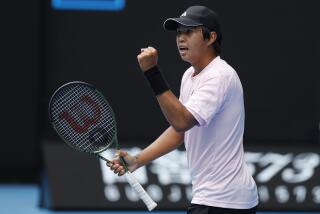PRIZE FROM THE PARK : Lori McNeil Is Crashing Tennis’ Country Club Set
- Share via
SAN DIEGO — In a sport dominated by the country club set, Lori McNeil is a rare prize from the park.
Wimbledon ’86 is where McNeil gained fame. MacGregor Park in Houston is where she learned her game.
Tennis.
Even while McNeil was playing Hana Mandlikova in the Wimbledon quarterfinals on Court No. 1 at the All England Lawn Tennis & Croquet Club, she had flashbacks to the hard courts located near the touch football field at MacGregor Park.
“In many ways it sort of seemed like we were still at MacGregor Park,” McNeil said. “The same people were around me. John (Wilkerson) was coaching and Zina (Garrison) and lots of friends from Houston were there.”
Mentioning Wimbledon and an inner-city park in the same breath would probably shock members of the All England club.
That is, if they didn’t know who the speaker was. And where she was coming from.
McNeil, the daughter of former Charger cornerback Charlie McNeil, is a 22-year-old black woman who is extremely proud of the route she has taken from MacGregor Park to the No. 40 ranking in WTA singles.
“Her background is a source of motivation for her,” Wilkerson said. “She knows where she came from and knows the price she paid to go against players who came from country club backgrounds. You can name the players who came from her background on one hand.
“That kind of youngster definitely wasn’t able to pay the kind of money needed to pursue a tennis career. Now, it costs around $100,000 to put a kid in a program. . . .
“There are very few black tennis players out there. Lori and Zina could be a heck of an inspiration for minority youth. It’s an American dream. She has accomplished so much with so little.”
Currently riding a hot streak, McNeil is seeded No. 8 in this week’s $75,000 Virginia Slims of San Diego at the San Diego Hilton Beach and Tennis Resort. In a first-round match Monday, McNeil defeated Lea Antonopolis, 6-3, 1-6, 6-2.
A hard-hitting and aggressive net player who thrives on fast surfaces, McNeil won four matches at Wimbledon before falling to Mandlikova, 6-7, 6-0, 6-2, in the quarterfinals. Two weeks ago, McNeil lost to Pam Shriver, 6-4, 6-2, in the finals of the $150,000 Virginia Slims of Newport.
It was the first professional singles final for McNeil, who was ranked No. 131 in 1983, No. 97 in 1984 and No. 93 in 1985.
“I’m starting to get things together,” McNeil said. “But I still didn’t win. I still have to make a lot of progress and put in more hard work. It’s just a step. I have to take many more steps.”
Wilkerson said: “Lori’s been growing slowly and steadily. Now, she’s beginning to blossom.”
One of McNeil’s strongest off-court attributes is the way she has learned to deal with the ghost of Althea Gibson.
It’s a fate and a pressure that haunts all promising young black female players.
Gibson won the Wimbledon singles and doubles in 1957 and ’58 and is a member of the Tennis Hall of Fame in Newport, R.I.
“Being compared to Althea is really unfair pressure to the player,” Wilkerson said. “Right away, when a player suffers her first setback, people say she is not reaching her promise. It’s unnecessary pressure.”
Said McNeil: “It’s not really pressure. If you’re compared to Althea Gibson, that’s great. She was a great player. But I don’t feel pressure. I feel support. There is a support system out there that tries to help you get to the top. People are pulling for me. Even a lot of people you don’t know are pulling for you. A lot of people congratulated me when I got home from Wimbledon.”
Houston is home. And MacGregor Park is her domain.
MacGregor Park is five minutes from the University of Houston. It has been renamed Ford Center, but the alumni and regulars still call it MacGregor Park.
The park has a pool, basketball courts, playing fields and 16 tennis courts. Before Wilkerson left his post as director of the public park district tennis program, MacGregor Park was the place in Houston for young tennis players with dreams.
When she was 10, the McNeils moved from San Diego to Houston. Charlie McNeil’s career was shortened because of two knee operations. He owned a share of a restaurant/night club in San Diego and then became involved in insurance and real estate.
“There was a down turn in the market and things got slow,” Charlie said.
“Ernie Ladd (who had been a teammate of McNeil with the Chargers) talked me into coming to Houston and getting involved in real estate down there.”
After working in real estate for four years in Houston, Charlie turned to offshore drilling. He now owns and operates a cab.
“We’re making a living in spite of everything. I’m optimistic and hopeful that something will work out.”
The move to Houston has been more beneficial to Lori than Charlie.
Lori was introduced to MacGregor Park when her mother, Dorothy, who played a little tennis, decided to take lessons from Wilkerson.
Soon after, Lori joined Garrison (currently ranked No. 12) in Wilkerson’s free tennis program.
“At first I was hitting the ball over the fence,” said McNeil, who is still powerful but has learned to control her strong strokes. “I’ve been playing tennis ever since the first day I went to MacGregor Park.”
In the summers, McNeil was one of a select group of 25 teen-agers to participate in Wilkerson’s tennis program. Each morning, she would walk or ride her bike a couple of blocks from their house to the park.
Seven days a week, from sunrise to sunset, Wilkerson’s group would work. They would run three miles a day, smash serves and hang around the courts waiting to hit alone with Wilkerson. That was a real treat.
“We used to line up to hit with him,” McNeil said. “John is really good with kids. He makes the sport really interesting, and then you take a love to it. He is a confidence-builder because he can make you think you can play.”
McNeil and Garrison were Wilkerson’s star students. Now that he is their coach, they are his star players.
“From the start, Lori was very coachable and very competitive,” Wilkerson said. “Lori and Zina were just the right thing for each other. They started pushing each other.”
They became hitting partners and best friends. But when they turned 18, their careers took different paths.
Garrison turned professional in 1982, and her career skyrocketed. She was ranked No. 16 in 1982, No. 10 in 1983, No. 9 in 1984 and No. 8 in 1985. She earned $274,470 in ’85.
McNeil went to Oklahoma State, where she won the Big Eight singles championship. And where her game began to stagnate.
“To be honest with you, I didn’t want Lori to go to college at all,” Wilkerson said. “The better players were going pro. But her parents wanted her to go to college. That’s where the lack of generations playing tennis came in. They didn’t think she could be that good at tennis. Her folks were more interested in her going to school.”
Wilkerson believed McNeil had greater potential than she was showing. Much greater.
“She was not progressing as I thought she should,” Wilkerson said. “After two years at Oklahoma State, she had to make a decision. She was not happy, tennis-wise, in college. And Lori is a tennis player.
“During her two years in college, Lori grew up enough to make her own decision. At 18, parents think they own you. But they learned to accept her decision.”
Despite opposition from her father, McNeil turned pro.
“I highly objected to it and so did my wife,” Charlie McNeil said. “I told Lori it was her decision, but I tried to get her to commit to another year (at Oklahoma State) and try to win the NCAA title. I felt it was premature for her to turn pro, but in the end the call was too great. Her coach said she was ready. In my heart, the coach was 99 and 9/10ths responsible. I accepted it reluctantly.”
Her parents have never seen their daughter compete in a professional tournament, but Wilkerson and Garrison provide McNeil with considerable courtside support.
Garrison and McNeil have played as a professional doubles team, but they have never met in singles. How would they match up?
“I stay away from comparisons between Zina and Lori because they are totally different people,” Wilkerson said. “I sort of dread the day when they might play one another.”
It will be a very special day at MacGregor Park.
More to Read
Go beyond the scoreboard
Get the latest on L.A.'s teams in the daily Sports Report newsletter.
You may occasionally receive promotional content from the Los Angeles Times.










